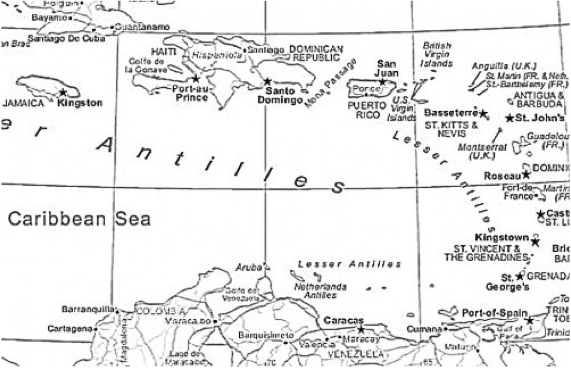By Michael W Edghill
Op-Ed Contributor
When it comes to US foreign policy, most of the focus tends to be on the Middle East and, increasingly, China. There is rarely a cursory glance offered in the direction of Latin America and the Caribbean, aside from discussions of the border with Mexico.
Unfortunately, this is due to the fact that most people do not recognize that the Caribbean is a gateway for two of the highest-priority security issues in the United States: drug trafficking and energy dependence. While the doomsday scenario of nuclear war in the Middle East is highly provocative, security in the Caribbean may have a greater effect on the everyday lives of Americans.
The Keystone Pipeline Project received so much attention, not solely because of the potential for job creation with the project, but because of its potential to provide another reliable source of foreign energy. Any security threat in the Caribbean could pose a grave threat to currently reliable sources of foreign energy.
Both Venezuela and Colombia were among the 10 largest suppliers of oil imports to the US in 2010. Even the island-nation of Trinidad and Tobago provided more oil to the United States in 2010 than did Libya.
Trinidad & Tobago also provides more natural gas to the US than any other nation except Canada. Perhaps an even more jarring statistic to drive home this point is that about 64 percent of all energy imports pass through the Caribbean Sea before they reach American refineries on the Gulf Coast. With the expansion of the Panama Canal, it is quite possible that the security of the Caribbean region could become even more important in the years to come.
The war against the drug cartels that has been undertaken by the Calderon government in Mexico has drawn the attention of Americans because of its tragic effects.
As the Mexican government has been waging this war, the operations of some of these cartels has been migrating towards Central American countries whose governments do not have the resources to combat their operations on the same scale that the Mexican government can.
Ray Walser, Senior Policy analyst at the Heritage Foundation, has said that the “gravest security challenge in the Americas remains the threat posed by transnational criminal organizations.” The ability and willingness of Caribbean nations to combat these highly-sophisticated drug trafficking organizations has the potential to dramatically alter regional security.
In addition to the threat that these organizations pose in Central American nations, a 2011 report by the Congressional Research Service highlighted the fact that Haiti, the Dominican Republic, the Bahamas, and Jamaica are considered “major transit” countries for illegal narcotics. The blueprint for many of these narcotics trafficking organizations was created by the cartels of Colombia years ago.
To this day, the Colombian paramilitary organization known as FARC produces about 90 percent of the cocaine consumed in the United States. No matter the drug, the way in which it gets from producers to consumers is very often by way of the Caribbean.
The United States government has ways in which it promotes and supports security measures in the region, such as through the Caribbean Basin Security Initiative.
But one must wonder how much more effective the US could be if it directed more resources and time towards aiding the security of its neighbors in Latin America and the Caribbean.
We must be insistent that the US government does not drop the ball on regional security matters that affect Americans on a daily basis because of its laser-focus on potential security issues half way around the world.
Michael W Edghill earned a B.A. in History from the University of North Texas and teaches courses about the Caribbean and U.S. Government in Fort Worth, Texas. He can be reached at michaelw.edghill@gmail.com
